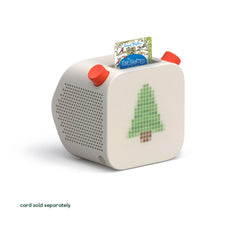Q&A with Dr. Larry Mitnaul: Your Top Sleep Questions Answered
Sleep is a tricky subject. When it comes to bedtime, every child - and every family - is different. And yet, bedtime battles are something that all parents face.
That’s why it’s important for us all to ask questions and to share what we know, so that we can all learn from and grow with each other.
We recently invited Dr. Larry Mitnaul - a Double Board Certified Child and Adult Psychiatrist - to chat with members of our Yoto Community and answer their sleep questions. Dr. Mitnaul is a Kansas-based father of five and founder of the Be Well Academy. He is passionate about all things parenting and provides a wide range of online resources for parents, teachers, and clinicians.

Dr. Mitnaul answered questions on bedtime routines, child development and emotional wellbeing from parents around the world. And, well… we all learned a lot!
Here are some of our favourites:
Is there an age where toddlers should stop taking a nap for developmental reasons? My almost-2-year-old still takes a 3 - 3.5 hour nap. I love it but want to make sure it’s appropriate.
Good question! There isn’t really a developmental reason to make children stop taking naps. Naps tend to gradually taper in the nursery years (3-5 years old). It sounds like you are cherishing nap time — as you should! My youngest is 4, and I still encourage her to take one from time to time (for all our sakes!).
My just-turned-3 year old has not slept through the night yet. He still likes a nap but I don't let him nap for too long or too late now, although it makes no difference. He wakes through the night from 11pm. Any tips?
Sleep at 3 years old can be a real challenge. During the toddler phase (12 months to three years), typical night time sleep tends to be around 9-10 hours in length. However, the length of time spent napping decreases to around 2 to 3 hours - and it occurs in one or two stretches at this intermediate napping phase.
Your child may need more time with implementing the strategies you have already tried. You could consider keeping a sleep diary (for the greater part of a month) which allows you to track how a particular shift in sleep routine (delaying bedtime, changing the bedtime routine, etc.) affects your child.
My clients are often surprised with the patterns that emerge when they take this approach. You’ve got this!
What does it say about me that my kids needing me at night triggers negative feelings? And how do I change that? I feel like it's normal and OK for them to need me, but I get angry about it in the moment.
I tell my parents and kiddos alike – anger is a human emotion that we all have, so there’s no need to fret or think ill of ourselves for having the emotion. The more helpful way to think about it is to ask, “why am I feeling this way?” and “does this feeling change how I respond to my children?”
Anger can be a sign of mental exhaustion, hunger, or how your brain announces that it is time to refuel with mindfulness or meditation (as an example). Once you get close to the source of the anger and its meaning, it will transform your approach and your emotions are likely to shift as well. The fact that you are curious about the emotion signals that you’re already doing what a great parent does — trying to stay attuned to your child.
Do you have any tips for getting children to resettle at night? Both of mine (3 and 5) wake up in the night and struggle to settle again.
Approach to bedtime “pop ups” can be quite different depending on the underlying reason for the awakening and there can be considerable difference between the reason for both your 3 and 5 year olds.
Here’s one consideration: for parents with multiple kids, staggering this routine may also be a “special time” for individual, undivided attention for those 15 minutes prior to bed. This routine also avoids surprises and soothes children’s sense of security in that they “always” know what comes next if anxiety is one of the variables keeping your child from feeling rested.
Since they were born, both my 6 year old and 20 month old wake multiple times per night. We co-sleep and I’m still nursing my 20 month old. I'm up for any tips to help the family get rested!
In general, I tend to look to the guidelines of the American Academy of Pediatrics around sleep and co-sleeping. Great job in linking sleep with how our kids do while awake. Sleep improvements in kids have been shown to improve mood, irritability, and focus in young kids (and big ones too) – so you’re right in making this a priority.
One of my favourite patterns to recommend, or have families focus on, is their sleep ritual or routine. They tend to be individual to each family – but imagine a routine or ritual that everyone can look forward to at night. Perhaps after brushing teeth, you snuggle and read a story or two, imagine together what you’ll dream about, and give goodnight kisses before heading to bed.
Maybe your ritual includes “Meditate with Me” or “Slow and Sleepy Stretches” Yoto cards which have been popular with my kids. See if you can craft an expectation for connection and the desire to go to sleep so that you can do it again tomorrow night!
My 5 year old hardly ever "naps" any more, but we still allocate a couple hours for "rest" time midday. Should we be skipping that altogether, or doing the 'rest' someplace other than her bedroom? I worry that not sleeping during that rest time is making it harder for her to wind down at night in the same space where she plays during the day. (But also, momma needs a break during the day, so I'm scared to let go of the rest time.)
You’ve offered a beautiful insight of finding both time for self-care and rest. 5 years old is a typical time where “nap time” tends to fade away. However, it is perfectly reasonable to have “quiet” or rest time which can be done in a place of your choosing. If sleep is “just not a thing anymore,” then rest time could still be in the room but I would avoid the bed to decrease the tendency for the brain to associate being in bed with other activities.
We hope these tips were helpful! For more parenting resources, you can follow along Dr. Mitnaul on Instagram or his website. If you aren't already, be sure to join our Facebook Group where you can connect with over 13,000 parents and Yoto fans from all over the world!
What topic would you like us to cover for the next #AskMeAnything? Let us know on social media, or send us an email at hello@yotoplay.com! 💤



